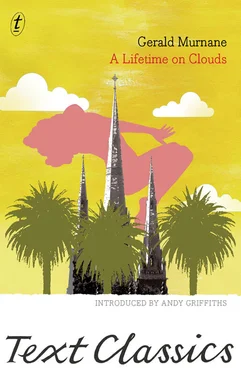Adrian read books by R. L. Stevenson, D. K. Broster, Sir Walter Scott, Charles Kingsley, Alexandre Dumas and Ion L. Idriess. But he never expected to find in literature any proof that grown men and women behaved as he and his women friends did in America. Somewhere in the Vatican was an Index of Banned Books. Some of these books might have told him what he wanted to know. But it was impossible that any of them would ever fall into his hands. And even if they did, he would probably not dare to read them, since the penalty was automatic excommunication.
But an innocent-looking library book eventually proved to Adrian that at least some adults enjoyed the pleasures that he devised on his American journeys.
Adrian borrowed books from a children’s library run by a women’s committee of the Liberal Party over a shop in Swindon Road. (There was no library at St Carthage’s College.) One afternoon he was looking through the books on the few shelves marked Australia.
In a book by Ion L. Idriess Adrian found a picture of a naked man lolling on the ground against a backdrop of tropical vegetation while his eight wives (naked except for tiny skirts between their legs) waited to do his bidding. The man was Parajoulta, King of the Blue Mud Bay tribe in the Northern Territory. Although he and his wives were Aborigines, there was a look in his eye that cheered Adrian.
The people of Accrington and the outer suburbs might have thought Adrian was crazy if they could have seen him with his women beside some beach or trout stream in America. But King Parajoulta would probably have understood. He sometimes played the very same games in the lush groves around Blue Mud Bay.
On the first Thursday of every month Adrian’s form walked by twos from St Carthage’s College to the Swindon parish church. First Thursday was confession day for the hundreds of boys at the college. The four confessionals built into the walls of the church were not enough. Extra priests sat in comfortable chairs just inside the altar rails and heard confessions with their heads bowed and their eyes averted from the boys kneeling at their elbows.
Adrian always chose the longest queue and knelt down to wait with his face in his hands as though he was examining his conscience.
The examination of conscience was supposed to be a long careful search for all the sins committed since your last confession. Adrian’s Sunday Missal had a list of questions to assist the penitent in his examination. Adrian often read the questions to cheer himself up. He might have been a great sinner but at least he had never believed in fortune-tellers or consulted them; gone to places of worship belonging to other denominations; sworn oaths in slight or trivial matters; talked, gazed or laughed in church; oppressed anyone; been guilty of lascivious dressing or painting.
Adrian had no need to examine his conscience. There was only one kind of mortal sin that he committed. All he had to do before confession was to work out his total for the month. For this he had a simple formula. ‘Let x be the number of days since my last confession.
‘Then the total of sins  (for weekends, public holidays or days of unusual excitement).’
(for weekends, public holidays or days of unusual excitement).’
Yet he could never bring himself to confess this total. He could have admitted easily that he had lied twenty times or lost his temper fifty times or disobeyed his parents a hundred times. But he had never been brave enough to walk into confession and say, ‘It is one month since my last confession, Father, and I accuse myself of committing an impure action by myself sixteen times.’
To reduce his total to a more respectable size Adrian used his knowledge of moral theology. The three conditions necessary for mortal sin were grave matter, full knowledge and full consent. In his case the matter was certainly grave. And he could hardly deny that he knew exactly what he was doing when he sinned. (Some of his American adventures lasted for nearly half an hour.) But did he always consent fully to what took place?
Any act of consent must be performed by the Will. Sometimes just before a trip to America, Adrian caught sight of his Will. It appeared as a crusader in armour with his sword upraised — the same crusader that Adrian had seen as a child in advertisements for Hearns Bronchitis Mixture . The Will was struggling against a pack of little imps with bald grinning heads and spidery limbs. These were the Passions. (In the old advertisements the crusader had worn the word Hearns on his breast and the imps had been labelled Catarrh, Influenza, Tonsilitis, Sore Throat and Cough. ) The battle took place in some vague arena in the region of Adrian Sherd’s soul. The Passions were always too many and too strong for the Will, and the last thing that Adrian saw before he arrived in America was the crusader going down beneath the exultant imps.
But the important thing was that he had gone down fighting. The Will had offered some resistance to the Passions. Adrian had not gone to America with the full consent of his Will.
In the last moments before entering the confessional Adrian tried to estimate how many times he had seen this vision of his Will. He arrived at a figure, subtracted it from his gross total and confessed to a net total of six or seven mortal sins of impurity.
Adrian often wondered how the other regular sinners got through their confessions. He questioned them discreetly whenever he could.
Cornthwaite never confessed impure actions — only impure thoughts. He tried to convince Adrian that the thought was the essential part of any sin, and therefore the only part that had to be confessed and forgiven.
Seskis had a trick of faltering in the middle of his confession as though he couldn’t find the right words to describe his sin. The priest usually took him for a first offender and treated him lightly.
O’Mullane sometimes told the priest that his sins happened late at night when he didn’t know whether he was asleep or awake. But one priest cross-examined him and got him confused and then refused him absolution for trying to tell a lie to the Holy Ghost. O’Mullane was so scared that he gave up the sin altogether for nearly a month.
Carolan used to confess just four sins each month, although he might have committed ten or twelve in that time. He kept a careful record of the unconfessed sins and swore he would confess every one of them before he died. He intended to wipe them out four at a time each month after he had finally given up the habit.
A fellow named Di Nuzzo boasted one day that a certain priest in his parish never asked any questions or made any comment no matter how many sins of impurity you confessed.
Di Nuzzo said, ‘I’ll never go to any other priest again until I’m married. You just tell him your monthly total and he sighs a bit and gives you your penance.’
Adrian envied Di Nuzzo until the day when the priest was transferred to another parish. On the first Saturday of every month Di Nuzzo had to ride his bike nearly five miles to East St Kilda just to have an easy confession. Two years later, when Di Nuzzo had left school, Adrian saw him one Saturday morning in the city waiting for a West Coburg tram.
Di Nuzzo grinned and said, ‘It had to happen. They’ve posted him to a new parish on the far side of Melbourne. I have to take a bus for two miles from the tram terminus. But I’m saving up to buy a motor-bike.’
On the first Thursday of every month, when he came out of the confessional, Adrian knelt in front of Our Lady’s altar and prayed for the gift of Holy Purity. Then he said a special prayer of thanksgiving to God for preserving his life during the past month while his soul had been in a state of mortal sin. (If he had died suddenly during that time he would have spent eternity in hell.)
Читать дальше

 (for weekends, public holidays or days of unusual excitement).’
(for weekends, public holidays or days of unusual excitement).’










